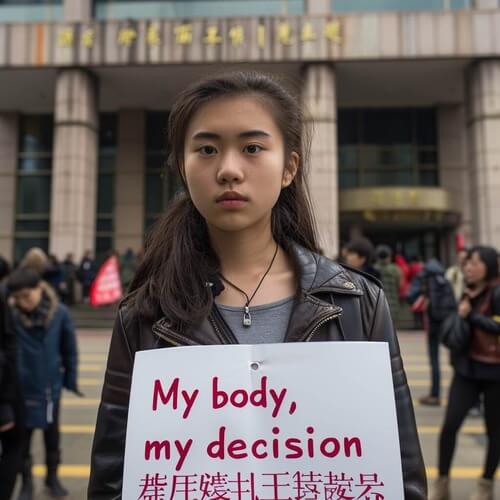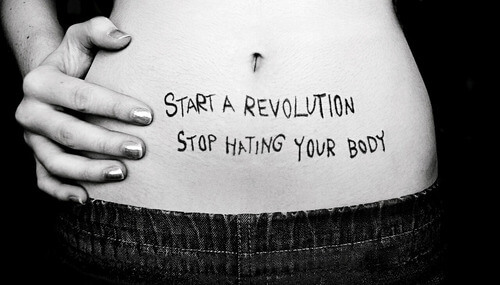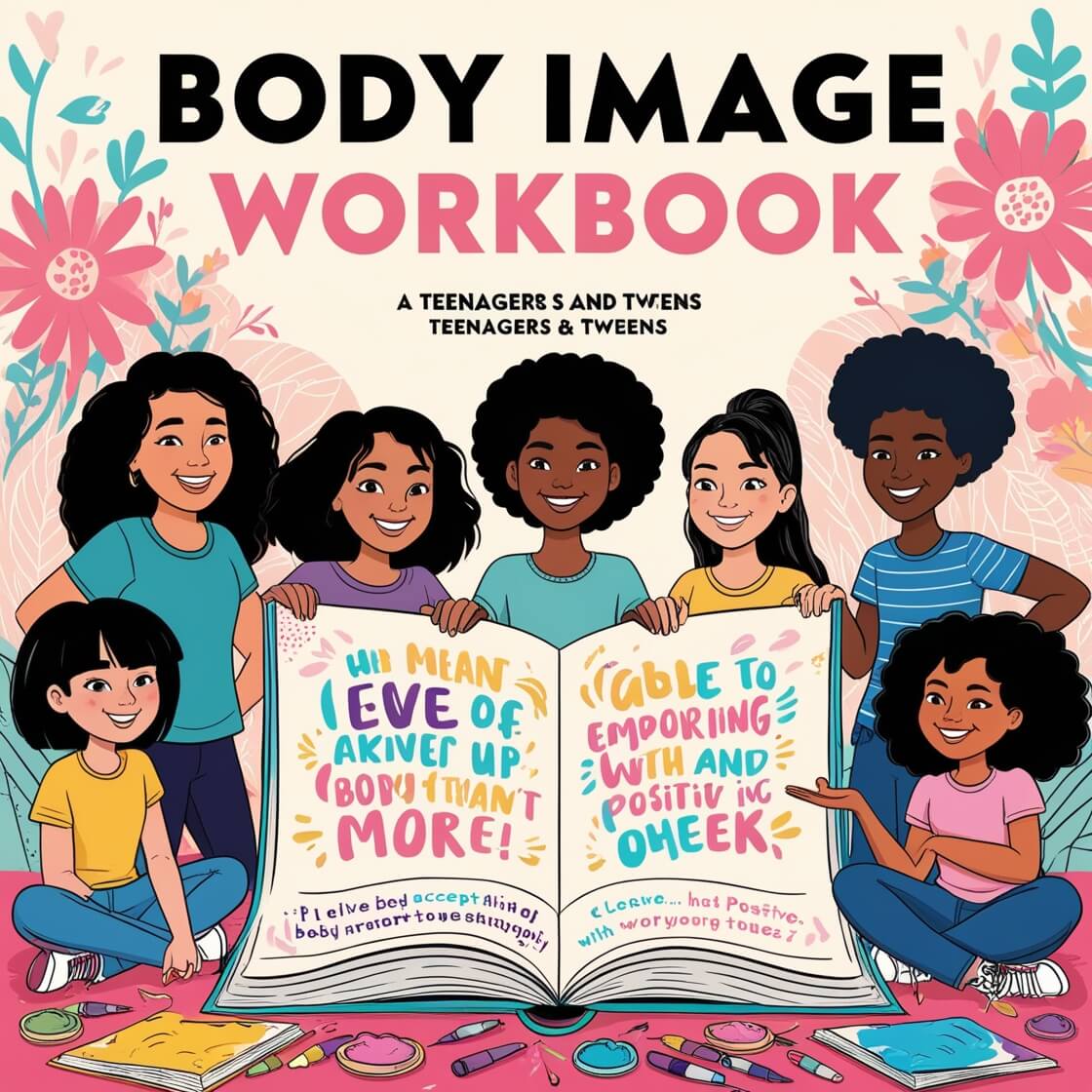Understanding and Supporting Teenage Body Image
With social media, peer pressure, and constant exposure to idealized images, teenage body image issues are more prevalent than ever. This can lead to feelings of insecurity and puts pressure on how they should look.
 Group of 11 teens smiling and each has a sign taped to their chest saying: unique, beautiful, strong etc.
Group of 11 teens smiling and each has a sign taped to their chest saying: unique, beautiful, strong etc.The Effects of Social Media and Peer Pressure
Constant exposure to edited images and idealized bodies can create unrealistic standards, making teens feel inadequate.
Combined with peer pressure, teens will often compare themselves to friends and influencers, striving to fit in.
What is Teenage Body Image?
Teenage body image refers to how adolescents perceive and feel about their physical appearance.
During puberty, teenagers experience numerous physical changes, and their bodies begin to take on adult forms.
It is during this time that teenagers are more self-conscious and critical of their appearance.
What is Body Shaming
Body shaming is a significant factor that negatively impacts teenage body image. It can come from peers, family members, or even within the teen themselves.
Never mention anything about their weight, size, or appearance. If concerned about their health or well-being, have them see a Dr. who is trained to talk to teenagers without doing harm to their health.
Recognizing Body Shaming
It's crucial for parents to recognize when body shaming is happening. It can be subtle, such as making a joke about someone's weight, or more direct, like criticizing their eating habits.
Sometimes, body shaming comes from well-meaning family members who believe they are helping. But, they may be doing more damage than good and are creating long-lasting insecurities.
Acknowledging Signs of Teenage Body Image Issues
It’s essential to be aware of the signs that your child might be struggling with their body image.
These signs can include:

- Frequent self-criticism: Your teen often makes negative comments about their appearance.
- Obsessive behavior: Excessive time spent on grooming, exercising, or dieting.
- Avoidance of social situations: Teens with body image issues might avoid social events due to fear of judgment or embarrassment.
- Mood changes: Increased irritability, anxiety, or depression.
The Role of Parents
You play a vital role in shaping your teen's body image. What you say and do for them can either make them feel better about themselves or contribute to their insecurities.
1. Address Body Shaming
Body shaming can have a severe impact on teenage body image.
It's crucial to address any instances of body shaming your teen may experience, whether it comes from peers, family members, or even themselves.
2. Lead by Example
Your behavior and attitudes towards your own body can significantly influence the body image of your teenager.
If you constantly criticize your own body or others', your teen is likely to have a similar attitude.
What you can do instead is show them how to appreciate their bodies. You should only speak positively about yourself and others, stressing the importance of good health over your appearance.
Sometimes, body shaming can occur within the family. Encourage a household culture of respect and positivity.
Address any negative comments or behaviours that may harm your teen’s body image.
Ways to Model Positivity:
- Compliment yourself and others on non-physical attributes.
- Talk to them about being kind and empathetic to others about their bodies.
- Discuss stories about people who have been successful regardless of their looks.
3. Encourage Healthy Habits
Focus on promoting a healthy lifestyle rather than emphasizing weight or appearance.
They could participate in sports, dance or just walk the dog. Be sure to make meals enjoyable and stress-free.
Practical Tips:
- Prepare balanced meals together.
- The whole family could engage in fun physical activities, like hiking or biking.
- Avoid using food as a reward or punishment.
4. Open Communication
Create an environment where your teen feels comfortable talking about their feelings and concerns. Listen without judgment and validate their emotions.
If they express insecurities about their body, acknowledge their feelings and offer reassurance.
For them, when someone listens and understands them, it can make a difference how they feel.
Ask Open Ended Questions:
- “How do you feel about the way you look?”
- “Have you ever felt pressured to look a certain way?”
- “What can I do to help you feel more confident?”
5. Educate About Media Influence
The media often portrays unrealistic and edited images that can distort teenage body image.

Teach your teen to be critical of what they see on social media, TV, and magazines.
Explain that many images are altered and don't represent real life.
Media Literacy Activities:
- Analyze advertisements and social media posts together.
- Encourage following diverse accounts that promote body positivity.
- Discuss the differences between online personas and real-life appearances.
6. Build Self-Esteem
A positive teenage body image is closely linked to overall self-esteem. Help your teen build confidence and a healthy self-image.
7. Celebrate Their Strengths
Focus on your teen's talents, skills, and qualities that have nothing to do with appearance. Praise their efforts, kindness, creativity, and intelligence.
Encourage hobbies and interests that they are passionate about so that they can feel a sense of accomplishment and self-worth.
8. Encourage Positive Self-Talk
Teach your teen to replace negative thoughts with positive affirmations. When they think, "I'm not good enough," encourage them to say, "I am unique and valuable."
Help them create a list of positive statements about themselves and remind them to read it when they're feeling down.
9. Promote Gratitude
Encourage your teen to practice gratitude. Focusing on what they are thankful for can shift their mindset from what's lacking to what they have.
Doing this regularly can improve how they see life and increase their self-esteem.
10. Seek Professional Help if Needed
Sometimes, despite your best efforts, your teen might need professional help to deal with teenage body image issues.
Therapists and counselors and other mental health professionals can provide the support and strategies your teen needs to build a positive body image.
Signs Professional Help is Needed
- Drastic changes in eating or exercise habits.
- Persistent sadness or withdrawal from activities.
- Persistent low self-esteem, or signs of depression and anxiety
- Self-harm or talk of suicide.
By recognizing the signs of a negative teenage body image and intervening early you can provide your teen with strategies to cope effectively.
Therapy and Counseling
Therapy can help teens explore what are the causes of their insecurities and develop coping techniques.
Cognitive-behavioral therapy (CBT) is effective in changing those nasty negative thoughts and behaviors that are related to your teen’s body image.
Support Groups
Support groups can provide a sense of community and understanding. Other teens who are going through the same issues can be very supportive.
11. Lastly Teach them Self-Compassion
 A picture of the lower part of a woman's tummy and written on it is: Start a Revolution Stop Hating Your Body.
A picture of the lower part of a woman's tummy and written on it is: Start a Revolution Stop Hating Your Body.Teach your teen the importance of self-compassion.
Encourage them to be kind to themselves and to treat themselves with the same care and understanding they would offer a friend.
Help them to develop a healthier relationship with their body by practicing self-compassion.
































New! Comments
Have your say about what you just read! Leave me a comment in the box below.